The 75 Best TV Comedies of All Time
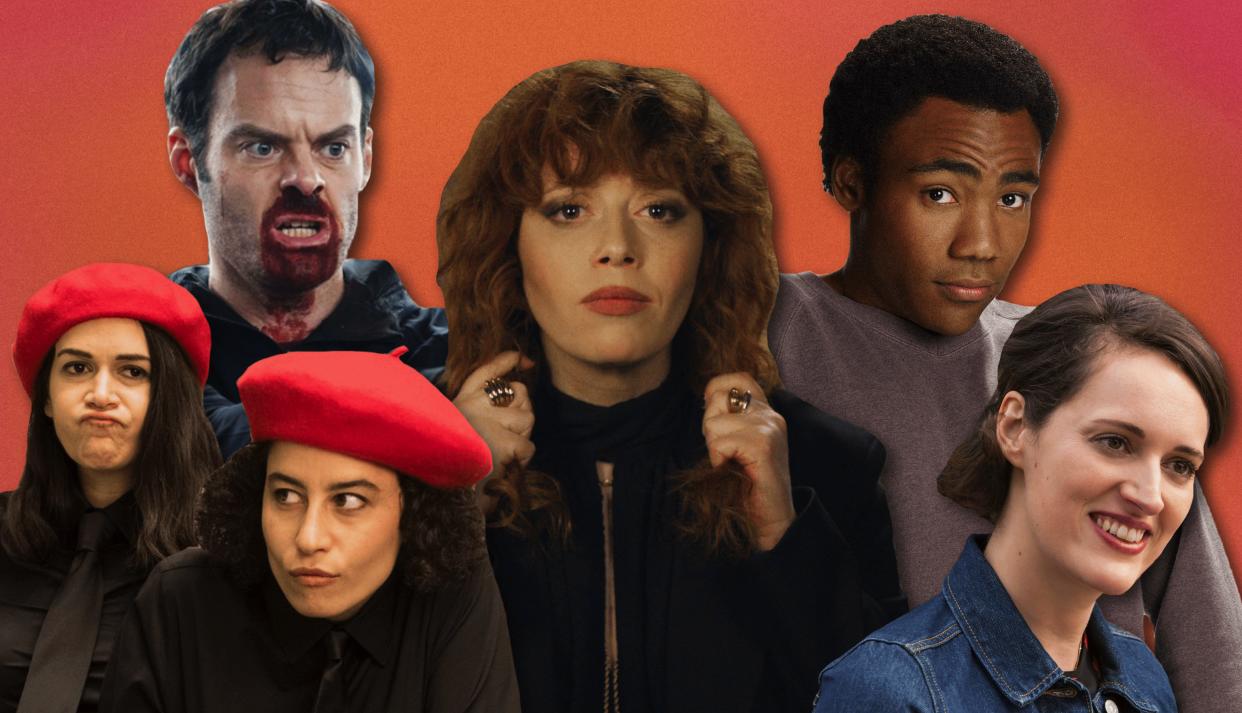
[Editor’s note: The below article was originally published on March 27, 2020. It has been expanded from the 50 greatest TV comedies of all time to 75, as of February 24, 2023.]
Comedy rules are made to be broken. If all laughter comes from some great psychological misdirect, then it follows that the funniest series are the ones that continue to take the unexpected routes.
More from IndieWire
But sometimes a comedy is memorable because of the rules that it inadvertently puts in place. Some foundational TV series have endured not because they were ratings or cultural juggernauts in their time, but because their spiritual descendants dotted programming lineups years — maybe even decades — after their cameras stopped rolling. As in other realms of entertainment, the TV comedies that endure and that are worth revisiting manage to speak to something brewing in their day and the audiences watching generations after. Sometimes it’s a matter of seeing how much the idea of good governance has changed since some starry-eyed optimists in Indiana closed up shop just a few years ago. Other times, it’s recognizing how a quartet of thankful friends in Miami are still providing comfort for viewers the same age as their great-grandchildren.
Of course, the platonic ideal of a TV comedy has changed over that time, too. The three-jokes-per-page maxim became gospel… and was then summarily tossed out the window as shows found more ways to be cathartic than a parade of laughs. There are the clever shows, the witty and the dry, the outrageous and the provocative, the ones that lean on your knowledge of all those others while delivering references with a wink and a nod.
So, in an effort to gather that unpredictable cross-section of over a half-century of TV comedies, we’ve tried to form our picks for the 75 greatest. We’ve tried our best to combat recency bias, while acknowledging that the explosion in quality TV of late has made it impossible to ignore that some all-time work is still unfolding in front of our eyes. Those developments also extend into the world beyond the fictional ones, where once-vaunted series have become irreparably tainted by the conduct of their stars and creators. (You can guess which ones those are by their omission in the collection below.)
Given IndieWire’s existing list of Best Animated Series, as well as our regularly updated coverage of what elusive international shows are (legally) available, this list only consists of live-action, scripted comedies. No animation, international, or sketch/variety series are included. That being said, IndieWire understands animation is a medium, not a genre, so please do not take this exception as anything more than an attempt to preserve our sanity in culling thousands of contending shows. After all, even with those options eliminated, there’s still a shocking number of possibilities to choose from. (The IndieWire staff has considered hundreds of programs and determines finalists through a recurring series of votes.) At this point in TV history, 75 might be a representative sum, but it’s far from comprehensive. Still, it’s worth saluting the following shows, that range from the spectacular to the magnificent.
Libby Hill, Proma Khosla, Kristen Lopez, Liz Shannon Miller, Noel Murray, Hanh Nguyen, and Tambay Obenson also contributed to this list.
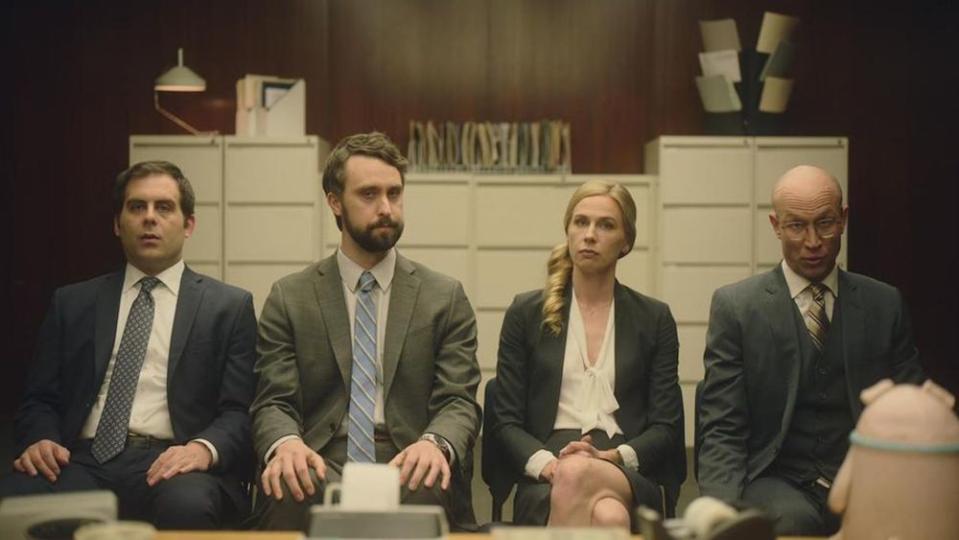
Courtesy of Comedy Central
75. “Corporate” (Comedy Central, 2018-20)
“Corporate” is the best-case scenario for a show that feels like a fever dream. Writers and creators Pat Bishop, Matt Ingebretson, and Jake Weisman were able to build a three-season long protest against the manipulations of capitalism, all without the show itself feeling like a commodity. It transformed office life drudgery — namely the exploits of cubicle-mates Matt (Ingebretson) and Jake (Weisman) — into jumping-off points for wild genre experiments. Some of those came on the backs of hopeless crushes or petty grudges. To move from small-scale office gossip to the geopolitical consequences of a massive mega-conglomerate was a trick that “Corporate” pulled off unnervingly well. And a crafty ensemble, led by a never-better Lance Reddick, made sure that the show never got bored even if Matt and Jake did. In a weird way, “Corporate” is kind of a period piece now, a perfect time capsule of a work structure that was collapsing even faster than the show’s creative team could have guessed. —SG
Read More: ‘Corporate’: Lessons on Finishing a TV Comedy as the World Collapses
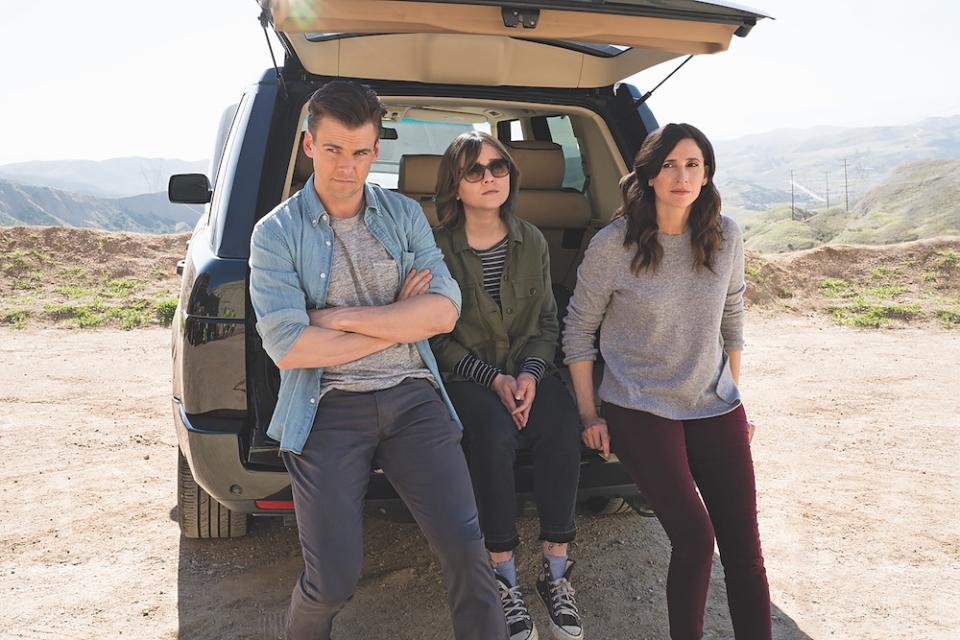
Courtesy of Greg Lewis / Hulu
74. “Casual” (Hulu, 2015-18)
There’s not really a plot synopsis that can capture what’s great about “Casual.” Yes, there’s the cross-generational looks at complicated romances. But what made this an early Hulu series standard-bearer is that it understood its characters deeply. There was a confidence that it was worth it to hang out with Valerie (Michaela Watkins), Alex (Tommy Dewey), and Laura (Tara Lynne Barr) through bad dates and messy breakups and the rays of sunlight in between. It would have been easy for a malaise to set in as it sometimes does for shows built around very specific LA problems. As the show evolved, though, it became less about one family slouching through life’s doldrums and more about the people you choose to accept into your life, for however long that happens. —SG
Read More: How Hulu’s Overlooked Gem Became Timeless in a Transformative Final Season
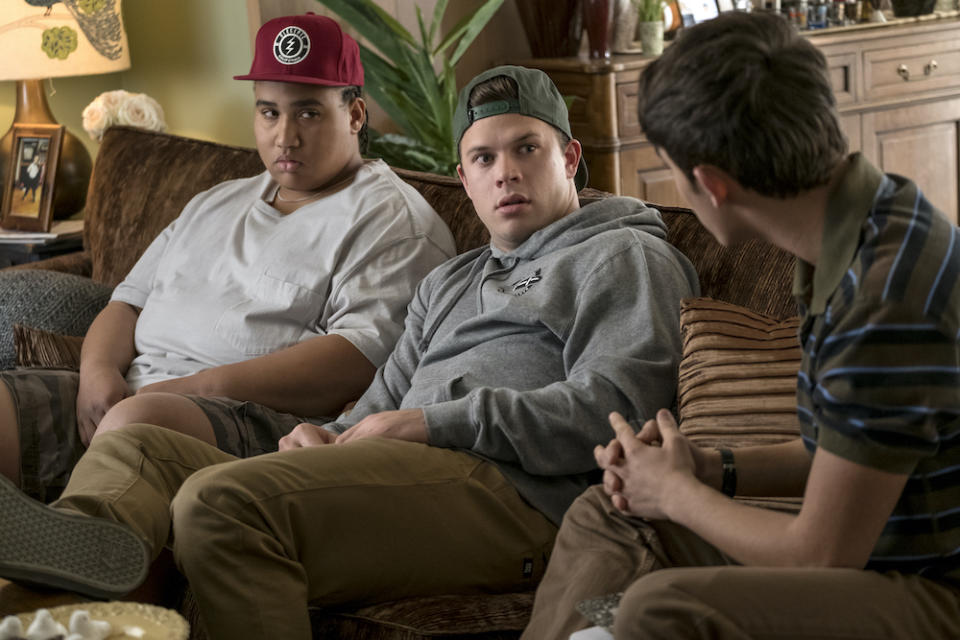
Tyler Golden / Netflix
73. “American Vandal” (Netflix, 2017-18)
With Netflix cranking out true-crime documentaries at an unprecedented rate, it was only a matter of time until the streaming service catering to everyone and everything would satirize its own subscribers’ favored genre. But no one could’ve expected such a comedy to be this good. Created by Dan Perrault and Tony Yacenda, “American Vandal” is at-once a low-brow laugh riot and a high-brow dissection of a particular filmmaking style. Season 1 asks a simple, now-iconic question — “Who drew the dicks?” — but pursues answers with a disproportionate intensity and structure that keeps the investigation compulsive, even when it’s calling attention to its own machinations. With a boost from a pitch-perfect Jimmy Tatro, Season 1 set a seemingly unreachable standard. Yet Season 2 lives up to its predecessor, pushing into even more complex territory as Perrault and Yacenda push themselves to cover fresh ground. It’s just a shame “American Vandal” had to end there, long before the true-crime grind slowed down. There’s plenty more to parody, and these creators clearly have plenty more to give. —BT
Read More: How Two Guys Combined ‘Making a Murderer’ and ‘Freaks and Geeks’ to Get One of 2017’s Best Comedies
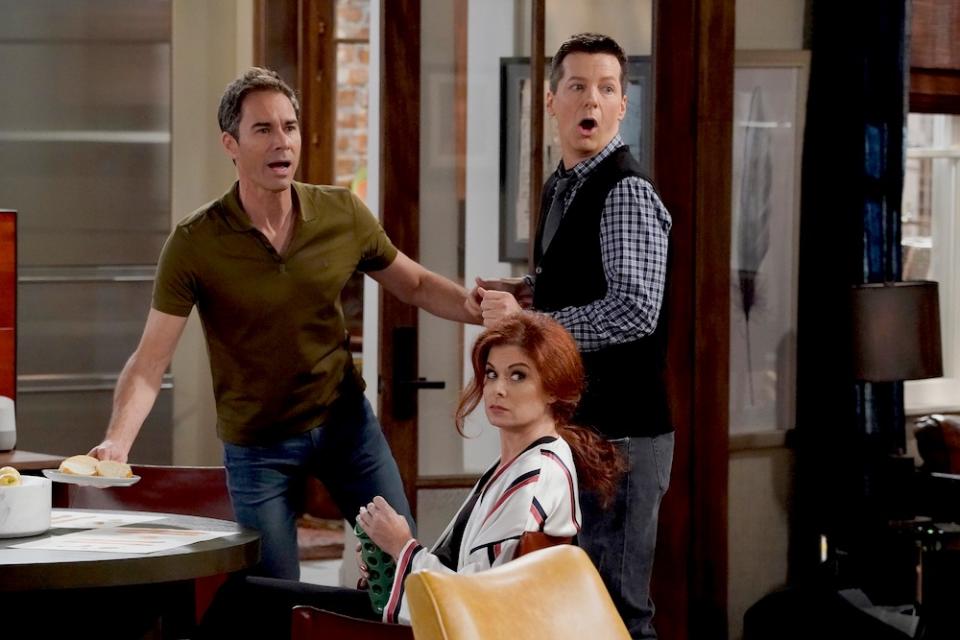
Courtesy of Chris Haston / NBC
72. “Will & Grace” (NBC, 1998-2006, 2017-20)
Winner of 18 Emmy Awards, nominated for 83, and with memorabilia from the series featured at the Smithsonian, it’s hard to overstate “Will & Grace’s” impact on American culture, queer culture, and the culture at large. (Heck, even its 2017 revival sparked copycats.) Set in New York, the NBC sitcom (shot in front of a live studio audience) follows best friends Will (Eric McCormack) and Grace (Debra Messing), a lawyer and interior designer (respectively) who may be the loves of each other’s lives but are still on the hunt for a comparable romantic partner. Their friends Jack (Sean Hayes), a sporadically successful actor, and Karen (Megan Mullally), a wicked socialite who spends her days as Grace’s “assistant,” join the central couple on their journey through life, along with a staggering list of guest stars including Gene Wilder, Molly Shannon, Woody Harrelson, David Schwimmer, Alec Baldwin, Kevin Bacon, Blythe Danner, Alan Arkin, Geena Davis, Janet Jackson, Bobby Cannavale, Wanda Sykes, Matt Bomer, Patrick Dempsey, Michael Douglas, and Matt Damon — not to mention recurring favorites in Leslie Jordan and Minnie Driver. “Will & Grace” will always be remembered for breaking barriers, but it also stood out by fitting in: This was a classic sitcom, through and through, that delivered big laughs week after week, on a ‘90s era broadcast schedule, and with top-tier talent (like James Burrows directing all 246 episodes) behind the scenes. All comedies should be so lucky. —BT
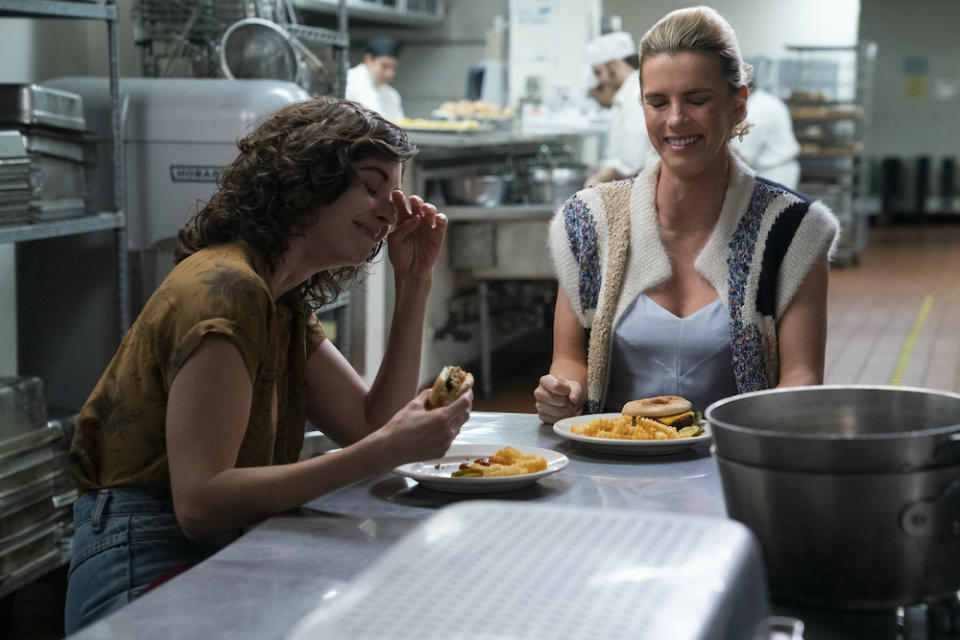
Courtesy of Ali Goldstein / Netflix
71. “GLOW” (Netflix, 2017-19)
Liz Flahive and Carly Mensch’s Netflix original series about the Gorgeous Ladies of Wrestling had no business being as sharp, funny, and eminently entertaining as it was — and for that we can all be thankful. Set in Southern California in the 1980s, the half-hour comedy puts an undeniably layered and feminist lens on female wrestling with its multifaceted cast and storylines. Alison Brie stars as Ruth, a struggling actress who takes issue with GLOW’s treatment of women as originally conceived by a man (Marc Maron). The job tests her, not least because of her acerbic boss but also because GLOW’s star is Debbie Egan (Betty Gilpin), Ruth’s ex-best friend whose husband she slept with. Clashing personalities make for tension behind the scenes and sparks in front of the audience, bonding the women of GLOW together whether they like it or not. —PK
Read More: Saying Goodbye to ‘GLOW,’ Which Was Always Worth the Wait

Courtesy of Greg Gayne / NBC
70. “Superstore” (NBC, 2015-2021)
NBC once again struck workplace comedy gold with Justin Spitzer’s long-running series about employees in a Walmart-esque megastore in the suburbs of St. Louis. Most of “Superstore” takes place inside the walls of Cloud Nine, where employee relations, eccentric customers, and squabbles with corporate headquarters provide endless fodder for comedy and catastrophe (often intertwined). The show delivers an immensely satisfying slow-burn romance with the laboriously woke Jonah (Ben Feldman) and no-nonsense working mom Amy (America Ferrera), as well as skillful storylines about sexual harassment, labor disputes, immigration, and more. Cloud Nine is filled with endearing, memorable characters, from the imperious Mateo (Nico Santos) to lackadaisical Garrett (Colton Dunn) to domineering Dina (Lauren Ash) to bumbling manager Glenn, giving it the instant feel of comfort TV, but with the added bite of a show about the working class, for the working class. —PK
Read More: ‘Superstore’ Ends as an Exceptional Office Comedy About What Makes America Work
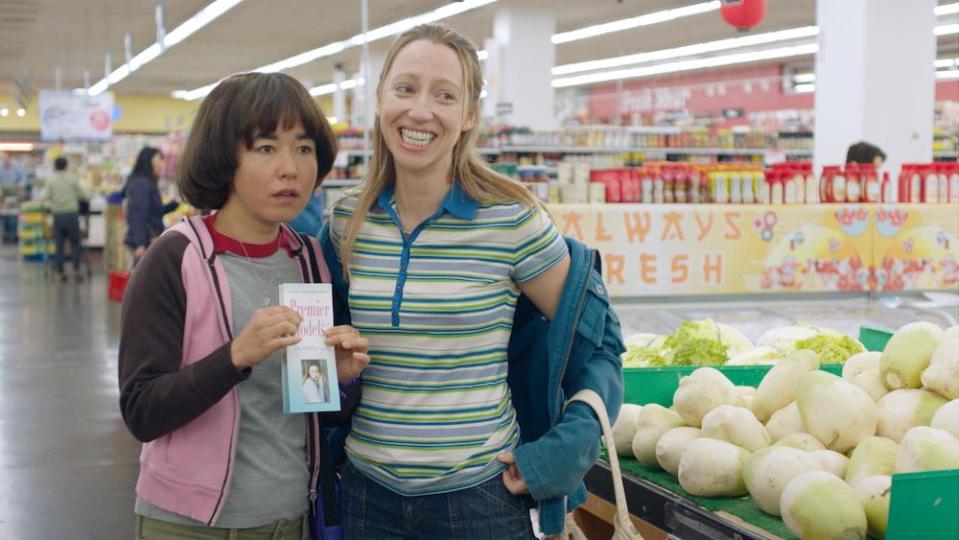
Courtesy of Hulu
69. “PEN15” (Hulu, 2019-21)
A cringe-comedy with a healthy dose of horror, “PEN15” takes viewers back to the most cursed time of all: middle school. Creators Maya Erskine and Anna Konkle star as 13-year-old versions of themselves going through preteen hell in the early 2000s — surrounded by actual preteen costars, which dials the awkwardness up to the max. Anna and Maya navigate friendship, hormones, peer pressure, and home life with naïve confusion, but also childlike warmth. The whole show aches with what makes that era so difficult to revisit — the yearning of its characters to be older and cooler while they don’t realize they have the rest of their lives to grow up. “PEN15” only got two seasons, but it was enough to leave a lasting (scarring?) impression on targeted millennial viewers, and to wrap up with a gut-wrenching finale about formative friendship as the truest form of love. —PK
Read More: The Final Episodes of ‘PEN15’ Provide a Beautiful Ending — and Help Explain Why It’s Time To Go

Courtesy of Gale M. Adler / CBS
68. “Everybody Loves Raymond” (CBS, 1996-2005)
Ostensibly, “Everybody Loves Raymond” embodies many of the sitcom stereotypes that tend to turn off more modern audiences. The CBS comedy follows a working husband and stay-at-home wife, the former of whom avoids any domestic responsibilities and the latter of which is often reduced to nagging him about helping out. Add in a mother-in-law who constantly gives her daughter-in-law a hard time and a father-in-law who won’t stop talking about the war, and you’re well on your way to a Cliched American Family bingo win. But like so many great mainstream comedies, “Everybody Loves Raymond” knew how to infuse specificity — of humor, of character — into accessible situations. Ray (played by Ray Romano, who served as co-creator with Phil Rosenthal) may have been a sports writer by day, but comedy was his trade; the character’s dry wit paired with a refusal to take anything seriously elevated everyday scenarios to gut-busting extremes. Debra (Patricia Heaton) and Ray’s mom, Marie (Doris Roberts) developed a comic rapport built on attack and defense. Frank (Peter Boyle) knew just when to time his zingers, and Robert (Brad Garrett) proved an empathetic wild card, often softening any sharp-tongued misunderstandings with his deft sense of humor. Together, they formed an impeccable ensemble built on timeless jokes (OK, mostly timeless jokes), but an anthropological ‘90s family unit — a group that personified the best (and, sometimes, the worst) of the era’s white middle-class suburban life. Watch it to remember, watch it for fun, but do watch it — “Everybody Loves Raymond” knows what it’s doing. —BT
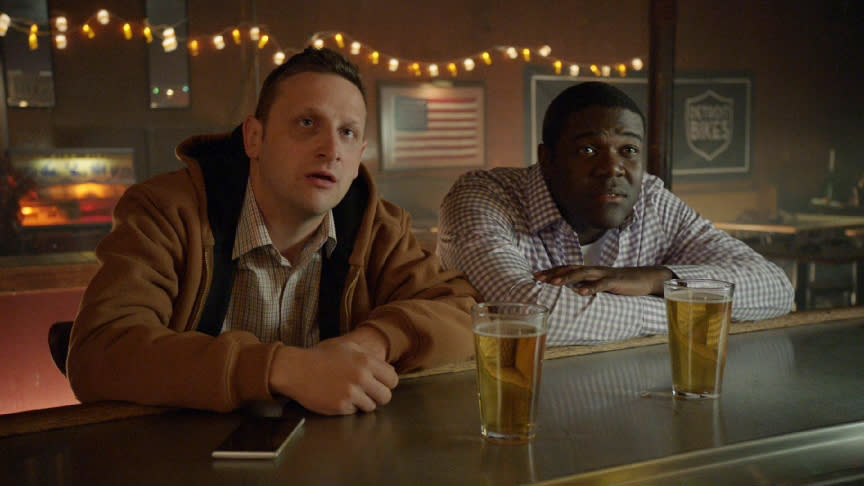
Courtesy of Comedy Central
67. “Detroiters” (Comedy Central, 2017-18)
“Detroiters” might be the purest depiction of friendship from any TV show of the last decade. Over two seasons, Tim Cramblin (Tim Robinson) and Sam Duvet (Sam Richardson) poured every last bit of goofiness and heart into their Detroit-area ad business. They helped sell wigs and tried to use local stars to help make new ones. They embraced the weirdness of their families. They gave Mort Crim the spotlight in an instant all-timer. At the end of the day, they were best buds who were never further away than the window next door. It wasn’t the first time Robinson and Richardson made magic together and it thankfully wasn’t the last. For the purest combination of sweetness and id that this pairing can offer up, look no further than this show that, in a just and righteous world, would have lasted far longer than 20 episodes. —SG
Read More: Sam Richardson and Tim Robinson on Ending ‘Detroiters’ — Yup, They’re Ticked Off, Too
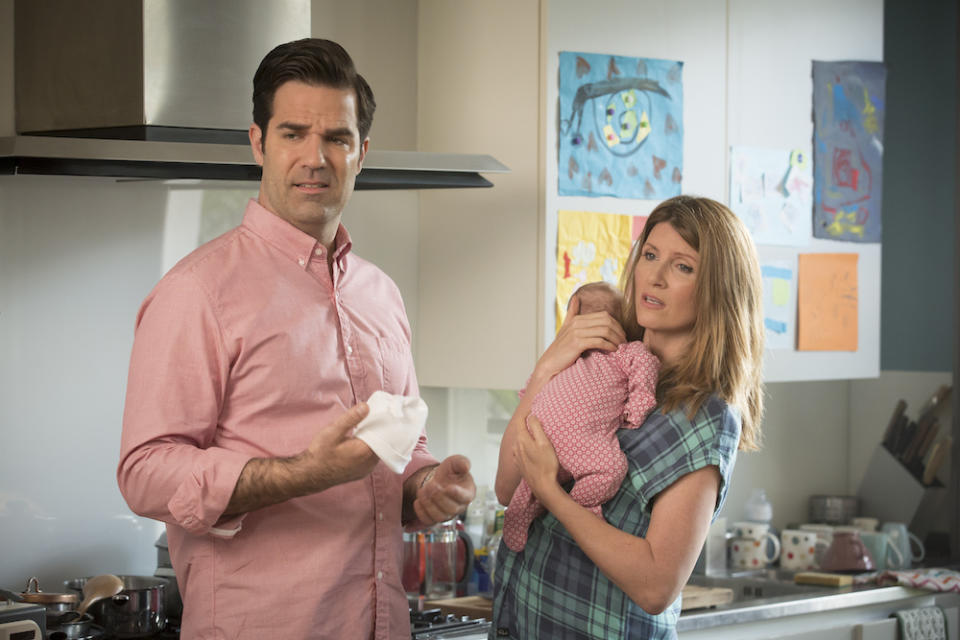
Courtesy of Ed Miller / Prime Video
66. “Catastrophe” (Prime Video, 2015-19)
When “Catastrophe” arrived in 2015, most comedies came laced with either arsenic or sugar. Combining the two wasn’t a novel concept, but Sharon Horgan and Rob Delaney landed on a spirit that switched from one to the other with ease. Whether in Rob or Sharon’s early semi-romance or the marriage that would eventually bloom from a messy one-night stand, the sweet and the nasty found a way to coexist. Because the characters had a frankness with each other, big-picture ideas of parenthood or love or commitment became less precious. That matter-of-fact approach to talking about secret hatreds or dating taboos or the weird things that bodies do all made the show richer and stronger. Having Delaney and Horgan as world-class joke writers made for a show that was hilarious enough to change its own formula with each passing season. It wielded its situational humor like a knife, always knowing exactly how and where to cut. —SG
Read More: Rob Delaney and Sharon Horgan on Depicting a Type of Alcoholism Rarely Seen on TV
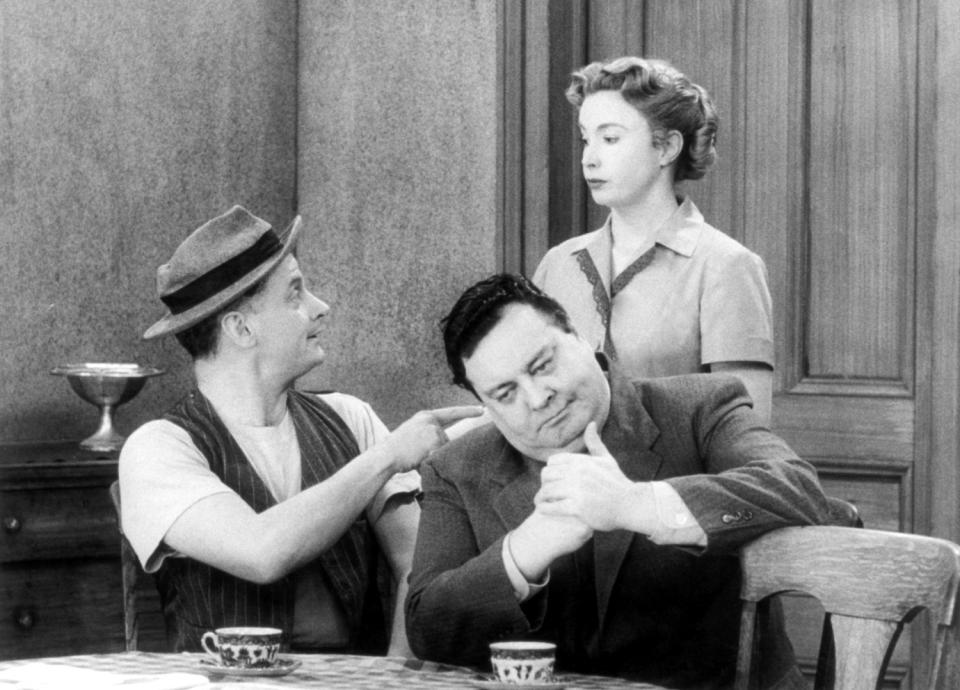
Courtesy Everett Collection
65. “The Honeymooners” (1955-56)
Throughout Jackie Gleason’s long run as a star and producer of TV variety shows, he relied on a few recurring characters — including an irascible New York City bus driver named Ralph Kramden, in a sketch called “The Honeymooners.” The cornerstone of the Gleason legacy is the 39 half-hour “Honeymooners” episodes he shot on film, which have aired in syndication continuously for over 50 years. The premise is simple: Ralph Kramden is a perpetually luckless working man, trying to get ahead in life with the help of his loving-but-exhausted wife Alice (Audrey Meadows) and his dopey-but-loyal neighbor Ed (Art Carney). Unlike all those ‘50s and ‘60s sitcoms steeped in a milieu of mild middle-class comfort, “The Honeymooners” was rooted in desperate failure. But it’s entertaining nonetheless, in part because the show has the spontaneity of live theater. Gleason knew how to work an audience, milking laughs with a slow burn followed by a hilarious eruption. —NM
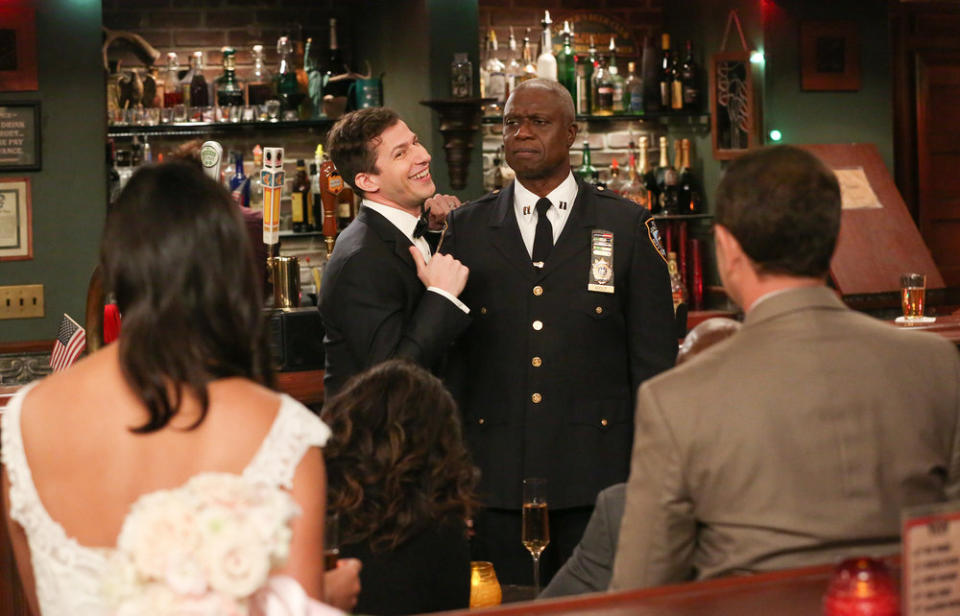
Courtesy of Vivian Zink / NBC
64. “Brooklyn Nine-Nine” (Fox, 2013-18; NBC, 2019-21)
A workplace sitcom about cops? In this economy? Dan Goor’s “Brooklyn Nine-Nine” maneuvered its way through a national reckoning with law enforcement — not to mention a premature cancellation — to maintain its sterling reputation as a hilarious, self-aware, and quick-witted police comedy. Starring Andy Samberg as Jake Peralta and Andre Braugher as his captain, Jacob Holt, the early seasons quickly established a strong cast chemistry before latter episodes experimented with extended, serialized arcs and further formal gambits. (“Brooklyn Nine-Nine’s” Halloween Heights are the stuff of legend.) Featuring sharp edits and colorful design, so much of what elevated the series above other long-running comedies went nearly unnoticed — the jokes were so solid and the actors so strong, it’s easy to overlook just how much this network comedy got right. But the episodes’ near-endless rewatchability welcomes such scrutiny. Viewers will be finding more to cheer about for years to come. Nine nine! —BT
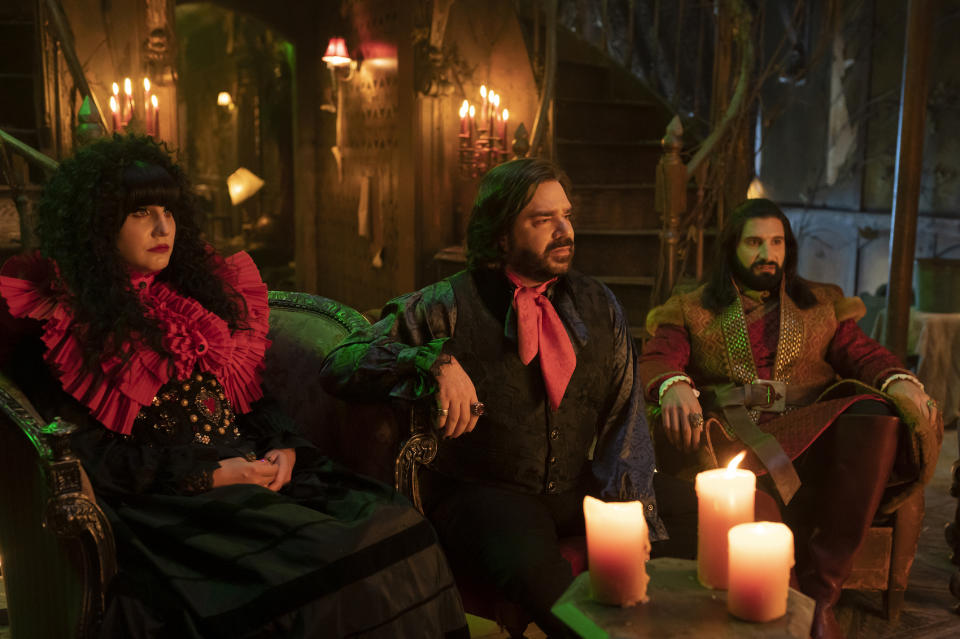
Courtesy of Russ Martin / FX
63. “What We Do in the Shadows” (2019-present)
What happens when you turn Taika Waititi and Jemaine Clement’s 2014 cult hit into a series? Only one of the best shows of the 21st century and maybe ever. On paper, “What We Do in the Shadows” is a mockumentary about vampires in Staten Island, but in practice it is a show so convoluted, so lovable, so riotously funny that it feels disrespectful to ever reduce it to a logline. Kayvan Novak, Natasha Demetriou, Matt Berry, Mark Proksch, and Harvey Guillén comprise the ensemble of a lifetime — or several — a dysfunctional chosen family that will live forever in darkness, bloodlust, and good old-fashioned narcissism. From the inner workings of the vampiric council to the werewolves, djinns, and wraiths, to everyday minutiae like faulty plumbing and putting your kid in school, “What We Do in the Shadows” keeps its total insanity grounded, providing a guaranteed hit viewing experience every time we step inside that crumbling mansion. —PK
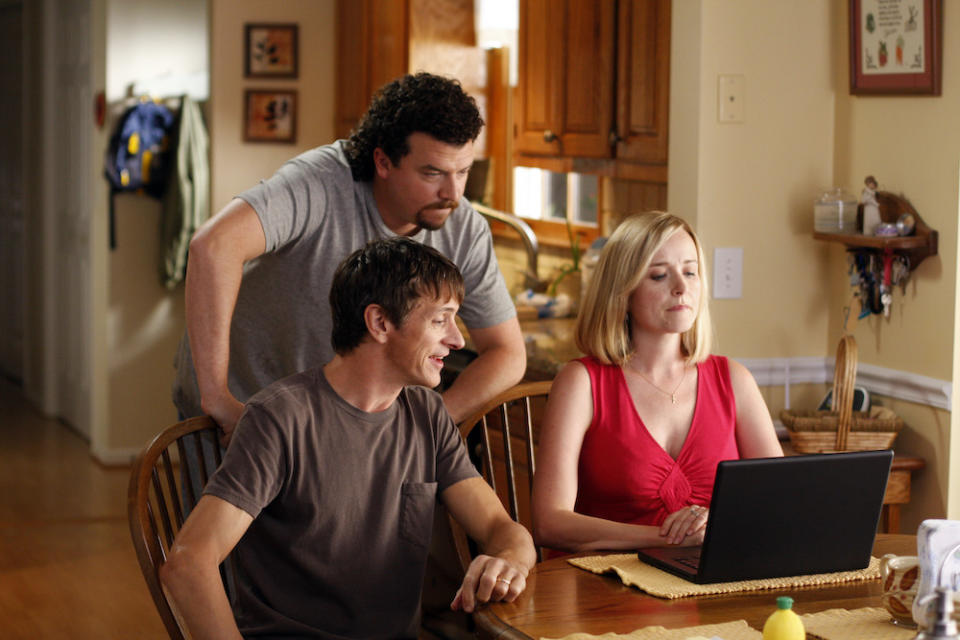
Courtesy of HBO
62. “Eastbound & Down” (HBO, 2009-13)
From would-be Vice Principal Neal Gamby (“Vice Principals”) to would-be head preacher Jesse Gemstone (“The Righteous Gemstones”), humility is the antithesis to every HBO character Danny McBride has ever played. The actor, producer, and writer has a way of embodying arrogance with such comedic swagger that the more infuriating the buffoon, the more appealing his struggle, and it all began with Kenny Powers. Forced out of Major League Baseball after pissing off everyone in the sport, Kenny returns to his North Carolina hometown to work in the only job he’s suited for: substitute P.E. teacher at the local middle school. After hitting bottom, Kenny tries to mount a comeback, aiming to reach the athletic heights of his youth without the personal lows of a youthful mentality. But that’s easier said than done. “Eastbound & Down” helped stretch HBO’s target audience beyond upscale coastal comedies like “Sex and the City” and “Entourage” through scathing satire from a crass, flashy, and unforgettable character. It also started a relationship between McBride (and fellow creators/producers Jody Hill and David Gordon Green) that’s still churning out outlandish comedy today. Unlike Kenny, Neal, and Jesse, McBride needn’t be humble about these accomplishments. Any one of them could be on the list next to “Eastbound & Down.” —BT
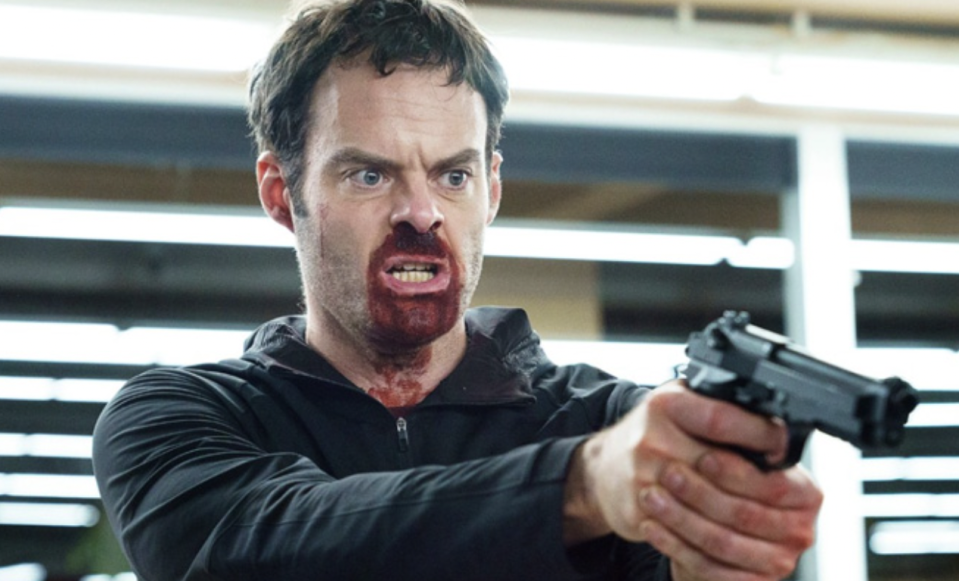
HBO
61. “Barry” (2018-present)
Bill Hader is one of the funniest sketch comics in the history of “Saturday Night Live,” capable of uncanny impressions and amusingly odd original characters. But his post-“SNL” work on “Barry” — which he co-created with Alec Berg — may be remembered as his masterpiece. Hader plays Barry Berkman, a psychologically disturbed ex-Marine and skilled hitman who suffers a crisis of conscience on a job in Los Angeles and decides to study acting with a ridiculous but kindly old drama coach named Gene Cousineau (Henry Winkler). The show is partly about the sometimes pathetic aspirations of Gene’s students (including the promising ingenue Sally, well-played by Sarah Goldberg), and partly about the bloody dominoes that fall in the criminal underworld due to Barry’s defection. “Barry” is as dark and gripping as it is funny. —NM
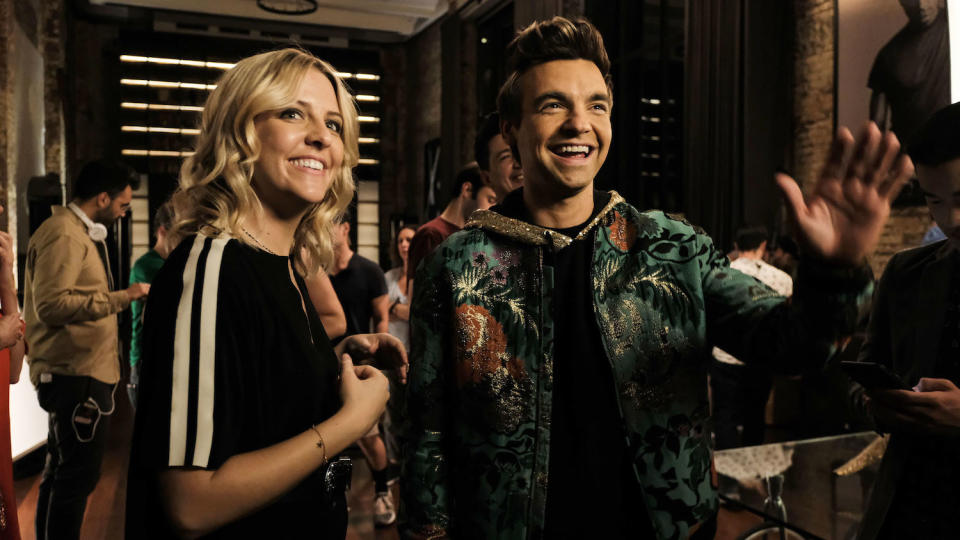
©Comedy Central/Courtesy Everett Collect / Everett Collection
60. “The Other Two” (2019-present)
The too-little-seen gem “The Other Two” is the story of siblings Cary and Brooke Dubek (played by Drew Tarver and Heléne Yorke), who struggled for years to find a foothold in New York show business only to become mildly famous overnight when their teenage brother Chase (Case Walker) turns into a YouTube superstar. Molly Shannon gives a winning performance as Pat, the Dubeks’ can-do matriarch — a recent widow whose tragic backstory and sunny disposition keep “The Other Two” from tipping too far into acerbic cynicism. Created by Chris Kelly and Sarah Schneider (the former co-head writers for “Saturday Night Live”), this show is both savvy and savage about the craziness of modern celebrity culture; but at its heart it’s a very human comedy, about some well-meaning people caught in the gears of internet fame’s perpetual motion machine. —NM
Best of IndieWire
Sign up for Indiewire's Newsletter. For the latest news, follow us on Facebook, Twitter, and Instagram.

 Yahoo Movies
Yahoo Movies 
